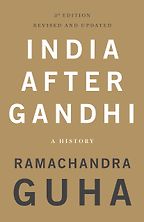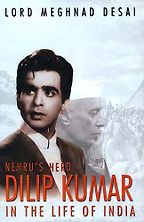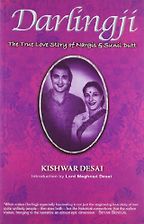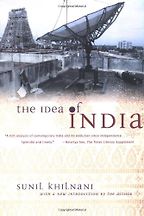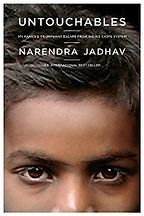Tell me about your first book, Ram Guha’s India After Gandhi.
This is a very detailed account of India over the past 60 years in one single volume. It’s a sort of one-stop shop on India. It is pro-Nehru, so it is a very secular view.
Jawaharlal Nehru was of course India’s first and long-serving prime minister, in power all the way from 1947 though to 1964, and an advocate for socialism and the public sector as the means by which economic development can be achieved by poorer countries.
And everybody was always saying: “Oh, India’s going to break up. It’s too diverse, there’s too much poverty, you’re going to have dictators.” But again and again India continues as a democracy. This is a book about how it happened in a country as large as Europe with diverse languages and religions. How can a place like this hold on to democracy?
How can it?
Well, the Western model says you need a middle class, you need literacy, you can’t do it with so much inequality, but India sets the example of the fact that it is possible. It is still a democracy with 700 million voters, 400 million of whom actually voted. The numbers are just mind-boggling. Even when Indira Gandhi imposed emergency rule, for 21 months from 1975-1977, the good sense of the Indian public got it all back, all their rights, and they don’t give up. Since independence the traditions of agitation and peaceful demonstration have upheld democracy.
Would you agree that the author has brought India very much to life in this book?
Well, he’s an anthropologist and, yes, he is a very good writer. I like that. It is a good read. It’s a portmanteau book on India. If you are going to read one book on India, one fat book, it would be this one.
So your next choice is your own book about the Indian film star, Dilip Kumar?
Yes. Nehru’s Hero is about how you relate politics and cinema, how a non-didactic, non-academic medium reflects a political era. It’s about how film roles change, how the social aspect of life is always changing people’s idea of what India was and the ideal of manhood, what your hero should be like.
The “idea of Indian manhood” sounds very Soviet in a way. Like those posters of chisel-jawed youths holding sickles.
In a sense that’s right. I mean, Indian heroes often come from the Punjab or from Peshawar where people are tall and fair because everybody likes that look and he embodies that. But it’s not a macho ideal of manhood. He always has a soft side, a feminine side and he’s crying and being sorry.
And how did his roles reflect a changing India?
Well, his early films are tragic, he’s losing the woman and crying and groaning and singing. It’s all about forces beyond his control shaping his destiny. But later he is a do-something hero, facing challenges and getting the girl. He is fighting the world and succeeding. In the mid-50s India became more hopeful, I think. People felt they could do something about their situation. The question of “is there justice?”
Is there?
Well, it’s hopeful, yes. Kumar was close to Nehru and his ideals. His heroes are positive Nehruvian men.
And you note that he never plays a Muslim?
He never played a Muslim, no. Even though he himself was a Muslim. It’s just something I noted as being special while I was writing the book. That he never plays a Muslim. Well, he does once play a Muslim, in a historical film – he played Salim in Mughal-e-Azam – but not in any of the others. The film heroes he plays are always Hindu characters and this comes in again and again. The Hindu-Muslim question never quite goes away. Never.
Your next book, Darlingji, deals with the period of partition between India and Pakistan and is a love story.
Yes. It is by my wife and Darlingji is what they called each other, these people – Nargis and Sunil Dutt. Their love story has its roots in the partition. I met my wife when I was writing my book about Dilip Kumar, and Nargis, a very famous actress, was a contemporary of Kumar’s. My wife did a lot of research for this, looking at the personal diaries and letters and interviewing everyone about how they kept the romance a secret and what happened. Nargis was a fantastic actress.
The book starts before Nargis is born though?
Yes, it’s the story of three generations of singers. The grandmother was a child widow who eloped with a sarangi player and then their daughter Jaddanbai who moves to Bombay and becomes an actress. Her daughter is Nargis and the book is about the obstacles she overcame before she was famous. It is very much from a woman’s perspective.
Your wife helped you with your book; did you help her with hers?
She showed it to me, but I said: I don’t want to co-operate on this – it is your book, and it is from that angle of being a woman. I would have intellectualised it. Although this woman was iconic she was treated like shit by her family and that’s a woman’s condition in India.
Still now?
Well, it gets better generation by generation, as the book shows. Nargis became a member of parliament and her daughter is now in parliament. Politics interact with cinema and with life in an interesting way, you see. The condition of Indian women is always improving.
The idea of improvement and optimism seems to run through your book choices.
Yes. So my next book, Khilnani’s The Idea of India, is a very intellectual book, written to mark the 50th anniversary of independence. It’s a Nehruvian book, with the idea of the synthesis of Hindu and Muslim, the urban cities and the countryside and whether the idea is sustainable. Nehru was a socialist, really Fabian society, Labour party, with a kind of keeping-it-all-together secularism.
And is the idea of India as modern, technocratic, egalitarian and secular sustainable?
I think India has proved that it is. The traditions of agitation and peaceful process are all still strong. I mean, this is a summary of the intellectual process of development. It is shorter, not the whole history, a selective book. You can read it in a day.
So this is
different from India After Gandhi? Is it not as colourful?
No. This is an argument rather than a big history. It is a single line of thought. If you read one short book on India then this is it. Khilnani is an academic with a PhD from Cambridge and he teaches at Johns Hopkins. He is writing a big biography of Nehru. He is a westernised Indian intellectual and this is a kind of argument about Indian identity.
Your last book is about the untouchables, a group fighting for their own identity.
Yes, Untouchables. This is really an amazing book. Amazing. Jadhav is an economist, he has an American PhD, and his family are from an untouchable caste. His widowed mother got on a train, with no ticket, and travelled illegally to Bombay because being untouchable was not as bad in a city and nobody knows you’re untouchable after a while. She got a job as a maidservant and so her children had access to urban India. Her son picks up reading and learns English. He ends up in Bombay broadcasting and gets a government flat so all his children go to the local schools and both the boys and girls have all travelled abroad – they have all reached the top. It is an amazing story of mobility, an optimistic real life story of people with no legal help taking opportunities and, with education, education, education, raising their status like iconic ballad heroes.
Have there been famous untouchables in India’s history?
Yes, Ambedkar, you know, was an untouchable. He was born in 1891 and was one of the first Dalits or untouchables to obtain a university education in India. He was the architect of India’s constitution and his slogan “Education, Agitation and Organisation” has shaped India. I put the Jadhav book in my list because it is amazingly inspiring.
Five Books aims to keep its book recommendations and interviews up to date. If you are the interviewee and would like to update your choice of books (or even just what you say about them) please email us at [email protected]
Five Books interviews are expensive to produce. If you've enjoyed this interview, please support us by donating a small amount.
